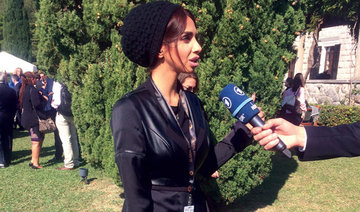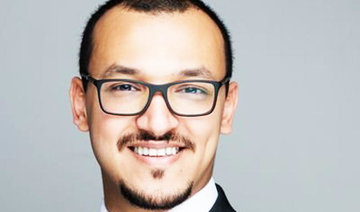RIYADH: Traffic Department Director General Brig. Gen Mohammed Abdullah Al-Bassami has said that women are more respectful of traffic regulations and more deserving of leadership.
Al-Bassami was speaking at the launch of the “Safe Leadership” project of the Ministry of Education, in cooperation with the Department of Public Affairs, for its teaching staff.
“Evidence suggests women are safer drivers, so we’re looking forward to women showing men a thing or two on the road,” Rebecca Lindland, car industry analyst, told NBC News in connection with an article that referred to the lifting of the Saudi ban for women to drive.
She also expected that new Saudi women drivers will be drawn to “smaller cars that are fit for one to four people.”
The same sentiment was aired by Amanda Stretton, former British race car driver and motoring editor of the Confused.com website.
“Women driving cars will transform traffic safety to educational practice, which will reduce human and economic losses caused by accidents,” Interior Minister Prince Abdul Aziz bin Saud bin Naif was quoted by local media as saying in the ministry’s Twitter feed.
Maj. Gen. Bassam Al-Attiyah of the Interior Ministry earlier told Arab News that there was an accident every minute, a death every 20 minutes and four injuries per hour, and 70 percent of accidents happened outside of cities.
The project is implemented by the Agency for Girls Education and represented by the General Administration of Training and Scholarship, in coordination with the Ministry of Interior.
The first phase of the project includes a training workshop to teach women the rules and important instructions regarding traffic.
The next phase involves a training program in the Saudi capital for trainers from each region and governorate, including workshops on values and good citizenship, problem-solving and risk management skills, as well as self-esteem and empowerment.
The project includes awareness lectures for 20 percent of the educational staff in the regions and governorates, an interactive e-learning platform as well as a training package.
The project’s three stages will include preparation, training and evaluation.
Evidence suggests women safer drivers than men: expert
Evidence suggests women safer drivers than men: expert

Saudi Arabia ‘categorically rejects’ Israel’s plan to seize Gaza territory

- Israeli authorities on Monday approved plans to take over territory and forcibly displace population
- Kingdom’s Foreign Ministry strongly condemns Israel’s violations of international law
RIYADH: Saudi Arabia’s Ministry of Foreign Affairs has “categorically rejected” plans by Israel to expand its military operations in Gaza and seize control of the territory.
The ministry also “strongly condemned the continued Israeli violations of international law and international humanitarian law.”
Israeli authorities on Monday approved a new ground operation to take over parts of Gaza, forcibly displace Palestinians into the south of the territory, and control the distribution of humanitarian aid. The Israeli army is calling up tens of thousands of reserve soldiers.
The announcement sparked widespread international condemnation. Saudi Arabia’s Foreign Ministry said it stood firmly opposed to any attempted expansion of Israeli settlements in the occupied Palestinian territories, and stressed the importance of holding Israel accountable for failures to comply with international resolutions.
The Kingdom continues to have “unwavering support for the Palestinian cause, in line with international legitimacy, the Arab Peace Initiative, and the establishment of an independent Palestinian state on the 1967 borders, with east Jerusalem as its capital,” the ministry added.
Saudi project destroys 600 more Houthi landmines and other explosives in Yemen

- The devices, cleared from various parts of the war-torn country in recent months, were safely detonated on Wednesday
- Project Masam has removed nearly 500,000 mines across Yemen since its launch in 2018
RIYADH: Members of the Saudi Project for Landmine Clearance, also known as Project Masam, safely detonated 600 mines, unexploded ordnance and other explosive devices on Wednesday.
The project’s engineers had demined and removed the devices over the past few months from various parts of Yemen, including the town of Beihan and the districts of Usaylan and Ain in Shabwah governorate.
Hussein Al-Aqili, commander of the project’s survey team, said they carried out the destruction operation in the Thahba area of Ain district on Wednesday as part of their ongoing mission to clear mines and other remnants of war in Yemen, and save civilian lives.
The project has cleared nearly 500,000 mines from the country since its work there began in 2018.
Last week, Ousama Algosaibi, the managing director of Masam, warned that the Houthis continue to exploit periods of truce to plant more mines across Yemen.
“We are in a constant race with the Houthi militias; we clear mines from one side while they plant more on the other,” he said during an interview with Al-Ekhbariya TV.
Saudi ambassador meets Bahrain King’s media affairs adviser

Saudi Ambassador to Bahrain Naif bin Bandar Al-Sudairi was received by Nabeel bin Yacoub Al-Hamer, media affairs adviser to the King of Bahrain, in Manama on Wednesday.
The adviser expressed his pride in the solid fraternal relations and deep-rooted historical ties that bind the two countries, the Saudi Press Agency reported.
He also wished Al-Sudairi continued success in his duties, which will further support and strengthen the fraternal ties, mutual coordination, and close cooperation between Saudi Arabia and Bahrain in various fields, and particularly in the media.
Saudi commission expands music access for people with disabilities

- Push for accessible arts programming reflects wider goals for social development
MAKKAH: Saudi Arabia’s Music Commission has launched a national initiative to expand access to music education for people with disabilities, marking a key step toward their greater inclusion in the Kingdom’s cultural landscape.
Focused on Riyadh, Jeddah and Alkhobar, the program trains instructors to teach students with physical and cognitive disabilities.
It supports the ambitions of Saudi Vision 2030, which seeks to elevate quality of life and ensure opportunities for all segments of society.
Music education expert Issa Al-Qarbi praised the initiative as a transformative step in supporting individuals with disabilities.
“Music is a highly effective medium for stimulating brain activity, developing motor and social skills, and enhancing overall psychological well-being,” he said.
The initiative includes adapting teaching methods, specialized curricula and fully accessible learning environments aligned with the requirements of the Mowaamah certification, a program which provides support to increase participation among disabled individuals in the labor market.
In designing the program, the commission partnered with international experts in music on the curricula and programs that align with global best practices.
The existing models were reviewed using the standards set by the National Association for Music Education.
The commission’s goal is to empower students to express themselves through music, boost their self-confidence and enhance their social, cognitive and motor skills.
The students will receive extended training that prepares them for group performances while supporting their artistic, cognitive and social development. Sessions with parents and community members are also being planned to raise awareness and encourage family engagement.
Al-Qarbi said that long-term sustainability and lasting impacts could be ensured by closer partnerships between the education and healthcare sectors.
He praised the initiative as a regional model, opening the door to further research and innovation.
He said that teaching music to individuals with disabilities went beyond technical skills, nurturing essential personal qualities such as patience, discipline and social engagement, which in turn positively influenced many areas of their lives.
Saudi surgeons separate Egyptian child from parasitic twin

- Dr. Abdullah Al-Rabeeah says operation is one of the most delicate carried out by his team
- Procedure takes 8 hours and involves multidisciplinary team of 26 consultants
RIYADH: A medical team from the Saudi Conjoined Twins Program successfully completed a surgical procedure on Wednesday to separate an Egyptian child from a parasitic twin.
The operation on 8-month-old Mohammed Abdulrahman Juma at King Abdullah Specialist Children’s Hospital in Riyadh took eight hours and was split into six stages. It involved a multidisciplinary team of 26 consultants, including specialists in anesthesia, neurosurgery, pediatrics and plastic surgery.
A parasitic twin, also known as a vestigial twin, is an identical twin that stopped developing during gestation and is physically attached to a fully developed twin. Because it did not fully develop, it cannot survive on its own and often dies in the womb or during birth.
Dr. Abdullah Al-Rabeeah, who heads the surgical team and is an advisor at the royal court and supervisor general of Saudi aid agency KSrelief, said the twins were joined at the back, lower chest, abdomen and pelvis. The parasitic twin lacked a head and essential organs, including a heart and kidneys.
Al-Rabeeah described the operation as one of the most delicate his team has been involved with, and thanked his colleagues for their efficiency and skill during the surgery, the Saudi Press Agency reported.
Mohammed and his parents flew to Saudi Arabia in March after King Salman and Crown Prince Mohammed bin Salman issued directives for medics in the Kingdom to help the child.
The operation on Wednesday was the 63rd separation procedure carried out under the Saudi Conjoined Twins Program, which has reviewed 149 cases of patients from 27 countries since its inception in 1990.






















